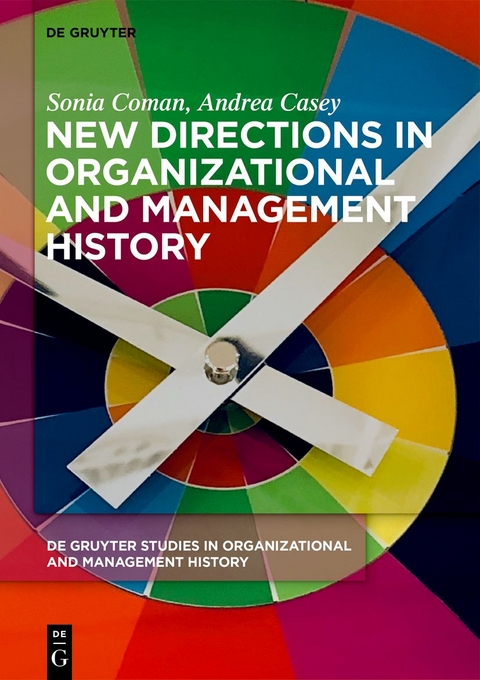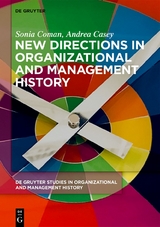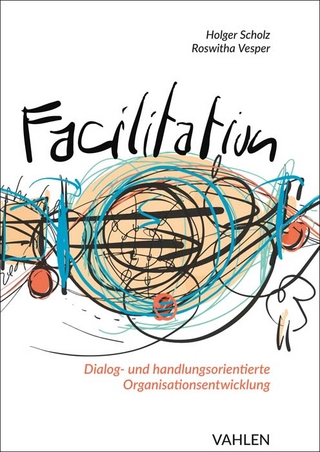New Directions in Organizational and Management History
De Gruyter (Verlag)
978-3-11-072041-9 (ISBN)
lt;p>Professor Sonia Coman, Curatorial Fellow, Freer and Sackler, Smithsonian Institution, Washington DC, USA.
Sonia Coman's research focuses on cross-cultural exchanges in the long 19th century, the history of ceramics, and the history of collecting. Sonia received a B.A. from Harvard (Phi Beta Kappa, Magna cum laude) and a Ph.D. in Art History from Columbia (supervisor Prof. A. Higonnet), where she wrote her dissertation on a set of Japanese aesthetic principles that spurred a reinvention of French and Japanese ceramics in the late 19th century. At Columbia, she designed and taught an undergraduate seminar on the soft power of ceramic arts across world cultures. She is also an avid reader and writer of Japanese verse. Her poetry has been awarded and published internationally.
Professsor Andrea Casey, George Washington University, Washington DC, USA.
Andrea Casey is Associate Professor, Human & Organizational Learning at George Washington University. Dr. Casey's teaching and research interests include organizational cognition in areas such as collective memory and organizational identity and learning. She is an active member of the Academy of Management (AOM) and has served as Division Chair for the Managerial and Organizational Cognition (MOC) Division and recently completed a three-year term on the Board of Governors. She has reviewed papers and proposals for multiple divisions of AOM including MOC, Research Methods, Organization and Management Theory, and Management Consulting and also reviews for the Eastern Academy of Management, the Academy of HRD, and the Organizational Learning, Knowledge and Capabilities International Conference. In addition she has reviewed for journals such as AOM Review, Organization Science, Management Learning, and Human Relations. Dr. Casey is on the Editorial Board of Management and Organizational History and was a member of the editorial board for the Journal of Management. She has more than 15 years' experience as an external HRD consultant to state government and private non-profit organizations throughout the USA. In her HRD work, she is primarily involved in leadership development, strategic planning and organizational change initiatives. She is author of Organizational identity and memory: A multidisciplinary approach published by Routledge in 2018.
Introduction
The introduction provides a rationale for the volume, as the first in this new series, and familiarizes the reader with the criteria and procedures that the two authors used in researching and writing the book. Lastly, this introductory section explains how the book is organized and how each chapter responds to the goals of the volume.
Part I: A History of Organizational and Management History
Chapters:
A Brief History of Organizational History
A Brief History of Management History
Organizational History vs. Management History
Gaps in the Literature
The first part traces the origin and evolution of the disciplines of organizational history and management history, adopting a global approach to the literature review. In exploring these fields in relation to one another, the authors envision a more integrated field in which the two disciplines benefit from each other's methodologies, theoretical frameworks, and research agendas. Within this framework, this part identifies and discusses the gaps in the literature, some of which are expanded upon in parts II and III.
Part II: New Directions in Theoretical Framing
Chapters:
Interdisciplinary Collaborations
Multimethod Approaches
New Theoretical Lenses (e.g., understanding time)
The second part focuses on new directions in theoretical framing for organizational and management history. Relying on the authors' survey of historical and recent literature, the part explores the advantages and potential pitfalls of interdisciplinary approaches, hybrid methodologies, and relatively new or underexplored theoretical concepts and perspectives.
Part III: New Directions in Empirical Approaches
Chapters:
Making the Case for Historical Case Studies
Case Selection: Underexplored Fields and Industries
The third and last part focuses on empirical studies, investigating new directions in the field, particularly the surge of interest in historical case studies and in selecting cases from underexplored industries (e.g., creative industries, fashion, gastronomy, etc.). This part builds on the previous one to shed light on how theoretical models can be built or further developed by expanding the scope boundaries and criteria in case selection, both temporally (e.g., learning from cases from the past) and spatioculturally (e.g., creative fields, nontraditional companies, and/or organizational structures).
Conclusion
The conclusion discusses the chapters in the book and reflects on the future of the field, setting the stage for subsequent books in the series.
| Erscheinungsdatum | 10.05.2022 |
|---|---|
| Reihe/Serie | De Gruyter Studies in Organizational and Management History ; 1 |
| Zusatzinfo | 6 col. ill., 2 b/w tbl. |
| Verlagsort | Berlin/Boston |
| Sprache | englisch |
| Maße | 170 x 240 mm |
| Gewicht | 354 g |
| Themenwelt | Wirtschaft ► Betriebswirtschaft / Management ► Planung / Organisation |
| Schlagworte | Forschungsmethoden • Managementgeschichte • management history • Organisationsgeschichte • Organisationstheorie • Organizational Culture • organizational history • Organizational Theory • Research methods |
| ISBN-10 | 3-11-072041-8 / 3110720418 |
| ISBN-13 | 978-3-11-072041-9 / 9783110720419 |
| Zustand | Neuware |
| Haben Sie eine Frage zum Produkt? |
aus dem Bereich




